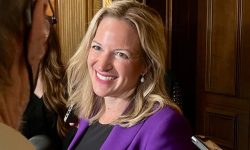Bipartisan Michigan auto insurance deal reached between Whitmer, Republicans

State lawmakers announced Friday they reached a deal on a Michigan auto insurance reform that they promise will lower costs while also barring insurance companies from using non-driving factors to set rates. They said they intend to vote on the bill before the end of the day, and send it to Gov. Gretchen Whitmer.
The deal comes after about two weeks of closed-door negotiations between Whitmer and Republican leaders in the Legislature, House Speaker Lee Chatfield and Senate Majority Leader Mike Shirkey.
According to a Senate GOP summary of the compromise, the bill would:
- Offer five options for personal injury protection coverage (PIP): Unlimited; $500,000, $250,000, $50,000 for those on Medicaid; a complete opt-out for those with qualifying private health insurance and seniors.
- Guarantee PIP rate rollbacks for eight years beginning on July 1, 2020.
- Outline a fee schedule to limit what medical providers can charge for care based on their percentage of Medicare reimbursement, phased in over two years (2021-2023).
- Ban the use of non-driving factors for setting rates, including sex, marital status, ZIP codes, credit score, homeownership, education level and occupation.
“The people we serve are demanding action,” Chatfield and Shirkey said in a joint statement Friday morning. “Today’s vote will be a significant victory for the hard-working people of Michigan that will finally fix our broken car insurance system and deliver real, meaningful rate relief for families, seniors and household budgets all over the state.”
The plan “will lower costs and protect coverage for Michigan drivers,” Whitmer said in a statement Friday morning. “I look forward to working with the legislature to pass and sign this important legislation into law.”
The deal came together under added pressure: Billionaire Quicken Loans founder Dan Gilbert’s team this week formed a ballot committee (Citizens for Lower Auto Insurance Rates) as promised late last year to push his own plan in the absence of a legislative compromise.
Whitmer reportedly said this week she is “not going to be bullied” on no-fault reform as speculation about Gilbert’s ballot drive swirled.
The private talks reportedly focused on two key areas — whether to allow drivers to completely opt out of buying personal injury protection coverage, or PIP, as Republican lawmakers prefer, and how much medical providers should be allowed to charge for care.
Late last week, Whitmer said she was open to discussing allowing drivers to purchase lower level options of PIP benefits, but opposed allowing them to buy no personal injury coverage because of the concern it would increase uncompensated care, a stance she appears to have modified under Friday’s deal. Whitmer also said she was concerned about the potential that costs would be shifted to taxpayer-funded Medicaid once drivers max out their auto insurance benefits, a possibility raised by both the nonpartisan House and Senate fiscal agencies.
Republicans, meanwhile, had supported the no-PIP option as a way to lower drivers’ PIP rates and give them more choices about the kind of coverage they want to buy.
Michigan has the highest auto insurance rates in the nation. Michigan is also the only state that requires drivers to buy unlimited, lifetime medical coverage with their auto insurance policies, which has further driven up prices.
To address that, the Republican-sponsored bills in the Legislature offered drivers the choice of buying different tiers of personal injury benefits. Under the bills, those tiers would include the current unlimited level, but also allow people to opt out of PIP altogether if they have other health insurance.
Both chambers’ previous versions added language introduced by Democrats that requires insurers to reduce drivers’ PIP rates for five years and prevents auto insurers from using non-driving factors to determine rates once state insurance regulators identify those factors as part of a study Whitmer ordered last month.
The previous bills would also limit the amount medical providers could charge for care related to auto injuries to the same rates set for workers’ compensation, a provision that has drawn protests from hospitals and others in the healthcare industry.
Most Democratic lawmakers previously voted against the Republican-backed bills, saying there’s no long-term guaranteed auto insurance rate savings after five years, nor any guarantee that insurers won’t offset a PIP rate reduction by raising prices on other parts of an auto policy.
In addition, many Democrats are concerned that allowing people to buy less-than-unlimited coverage would leave drivers vulnerable to financial risk if they’re ever catastrophically injured in a crash — a concern also expressed by medical providers.
“In almost any other circumstance, the notion of choice would be perfectly laudable,” said Tom Constand, president and CEO of the Brain Injury Association of Michigan and a board member of the Coalition Protecting Auto No-Fault, which opposes the GOP-backed bills.
In allowing more options than only unlimited PIP coverage, “naturally the only criteria that people would use to determine which level they would take would be price,” Constand told Bridge this week amid ongoing negotiations.
That means fewer people would choose unlimited coverage, thus making it more expensive, he said, leading to “the death knell” for lifetime care.
The group that lobbies on behalf of auto insurers, meanwhile, says the focus on banning the use of non-driving rating factors — such as credit scores and ZIP code, which many Democrats say contribute to redlining and higher prices for Detroit drivers in particular — distracts from the fact that medical providers are allowed to charge auto insurers more than traditional health insurers for the same service.
“Rating factors are used to more accurately price each policy,” Tricia Kinley, executive director of the Insurance Alliance of Michigan, said Thursday. “If you eliminate a driving factor, it will not lower the cost overall. It will simply shift around who pays. So one group of people would be subsidizing another group. That’s not fair.”
Kinley said auto insurers remain opposed to mandated PIP rate reductions, but said as part of a compromise they would have to come alongside medical cost caps. If insurers can’t reach the required targets, she said, some companies could decide to stop selling policies in Michigan, leading to less competition that naturally could drive prices lower.
Some lawmakers shared Thursday afternoon that details of the no-fault talks have been kept especially close to the vest.
“Conversation’s been very tight,” said state Rep. Sherry Gay-Dagnogo, D-Detroit, who opposed the bill that passed the House two weeks ago.
Gay-Dagnogo, who on Wednesday introduced legislation that would ban auto insurers from setting rates based on non-driving factors such as credit score and educational attainment, said she has spoken to Whitmer but has not received intricate details of talks.
“It’s important to kind of hold sacred the conversations and the intricacies. Otherwise, it doesn’t show good faith on all parties,” she said. “I believe that (Whitmer) is sensitive to all the challenges — certainly, the overwhelming rates that we’re paying, the impact of redlining, the impact passing legislation could have on our hospitals, as well as long-term care.”
The Gilbert-related ballot committee’s rollout was timed in part to pressure policymakers from both parties to reach a deal, Quicken lobbyist Jared Fleisher told Bridge in an interview Thursday.
“What we saw is that it really put fuel into the fire on all sides to come to the table, because I think leaders on all sides of this issue … want to be the ones to deliver a solution to the people,” Fleisher told Bridge. “It was something that was intended to put everybody on notice that now is the time to put the foot on the gas in terms of coming to a deal, because if that doesn’t happen, then there’s going to be this alternative.”
Come back to Bridge Magazine Friday for updates as they become available.
See what new members are saying about why they donated to Bridge Michigan:
- “In order for this information to be accurate and unbiased it must be underwritten by its readers, not by special interests.” - Larry S.
- “Not many other media sources report on the topics Bridge does.” - Susan B.
- “Your journalism is outstanding and rare these days.” - Mark S.
If you want to ensure the future of nonpartisan, nonprofit Michigan journalism, please become a member today. You, too, will be asked why you donated and maybe we'll feature your quote next time!




